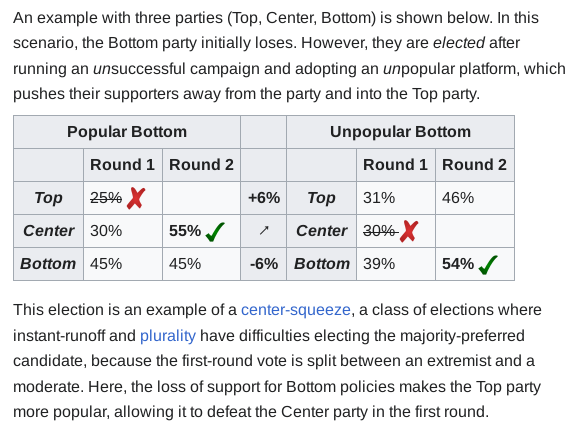No, I'm not putting this in /c/electoralism , for reasons found in the third paragraph
Most people know there's first-past-the-post and there's ranked-choice. But I've recently learned there's a much longer list than that, and they all have pros and cons.
Somecomrades would say 🙄yeah bourgeois elections who cares🙄 but that is wrong: the mathematics applies to all voting. It's the engineering side of the question: "If we have a bunch of people, maybe a hundred, maybe a million, how do we decide what the collective will is in the fairest way?" The name of the field is social choice theory because a social group is trying to make a choice.
You: oh bourgeois elections are a farce lol
Me: exactly and that's why we need to study how can voting be not a farce
First-past-the-post gets a hard time, and deservedly so. But the people who say "first-past-the-post bad, ranked choice good" are oversimplifying. It turns out there are all these mathematical trade-offs, and it is formally provable that there is no perfect system.
Most ranked choice voting systems* can suffer from a crazy effect where getting more votes makes you lose. The technical name for this is a monotonicity failure because mathematicians are shit with names. (*There are theoretical ranked-choice votings that don't fail monotonicity, but I don't know of any being applied in a political system. Companies probably have used them.)

In the 'Popular Bottom' Scenario, ![]() gets 45% of the vote and isn't elected; but in the other scenario he gets 39% and is elected. What happened is he lost supporters to a rival (Top) who eliminated his other rival (Center) for him, so he was able to sneak in.
gets 45% of the vote and isn't elected; but in the other scenario he gets 39% and is elected. What happened is he lost supporters to a rival (Top) who eliminated his other rival (Center) for him, so he was able to sneak in.
First-past-the-post doesn't have this problem: more votes is always better. But it has plenty of other problems. The USA system fails the no favorite betrayal criterion catastrophically; that's the criterion that you should be able to vote for who you like best. Usans "have to" vote for a candidate they hate.
This page summarises it pretty well: https://en.wikipedia.org/wiki/Comparison_of_voting_rules with tables comparing the different traps multi-winner systems fall into and the traps single-winner systems fall into.
Some cool systems:
-
PDF – "This paper discusses the protocol used for electing the Doge of Venice between 1268 and the end of the Republic in 1797"
Anyway, interesting stuff to think about if we design democratic/anarchistic systems for collective decision-making. It wouldn't have to be electing representatives, it could be voting on policies, same maths either way.

How are spd still functioning then? Or dems? They may grumble, they still do their shit. People “don’t like it, but will do it” happens way more often than “fuck y’all with this shit” . Inside (ideological) parties they have core program, not whatever neolibs are doing, like party goals. Commies believe in abolishing ownership, fashies believe in rounding up minorities, dems believe in private-public ownership and minority rights signaling. You agree with core program and deal with bullshit